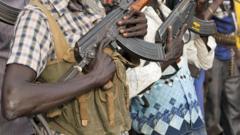The UN has expressed grave concerns about the unrest in South Sudan, highlighted by the use of barrel bombs in airstrikes amidst a power struggle between the government and the rebel White Army militia. The situation poses a significant risk to stability and peace since the 2018 agreement.
Tensions Rise in South Sudan as UN Warns of Imminent Civil War

Tensions Rise in South Sudan as UN Warns of Imminent Civil War
A recent escalation in violence involving barrel bomb airstrikes raises alarm among UN officials regarding the potential return to civil conflict in South Sudan.
In a critical warning, the United Nations has highlighted the escalating violence in South Sudan, suggesting the country may be on the brink of another civil war. Recently reported incidents of airstrikes employing barrel bombs—a weaponry suggested to contain volatile chemicals—have intensified fears, with significant casualties and severe injuries, particularly burns being reported.
Nicholas Haysom, leader of the UN mission in the nation, specifically pointed to clashes in Nasir, an oil-rich area in Upper Nile State, where rebel fighters from the White Army have taken control of a military base. He expressed that a renewed conflict would obliterate the progress made since the 2018 peace deal, which ended a brutal five-year civil war that claimed nearly 400,000 lives.
Haysom condemned the government’s aerial bombardments, asserting they resulted in indiscriminate harm to civilians, including many women and children. Recent estimates suggest that over 63,000 individuals have been displaced, creating an urgent humanitarian crisis. The ongoing violence has been exacerbated by heightened ethnic tensions, misinformation, and provocations, especially with impending elections expected next year.
Local officials, including James Gatluak Lew, have accused state forces of deploying "chemical bombardments," a claim that correlates with findings of flammable substances at attack sites. Despite government assurances that military operations targeted only White Army positions, the UN has reiterated the widespread civilian impact.
In a twist to the conflict, Vice-President Riek Machar has claimed that Ugandan forces are also violating South Sudan's integrity with military strikes, raising further concerns about regional dynamics and interference. The involvement of neighboring countries adds complexity to the fragile state of peace, igniting fears that longstanding grievances could spiral back into widespread warfare.
As the UN seeks to utilize diplomatic efforts to stabilize the situation, the international community watches closely, fearful that South Sudan's struggle may again engulf the region in conflict.




















